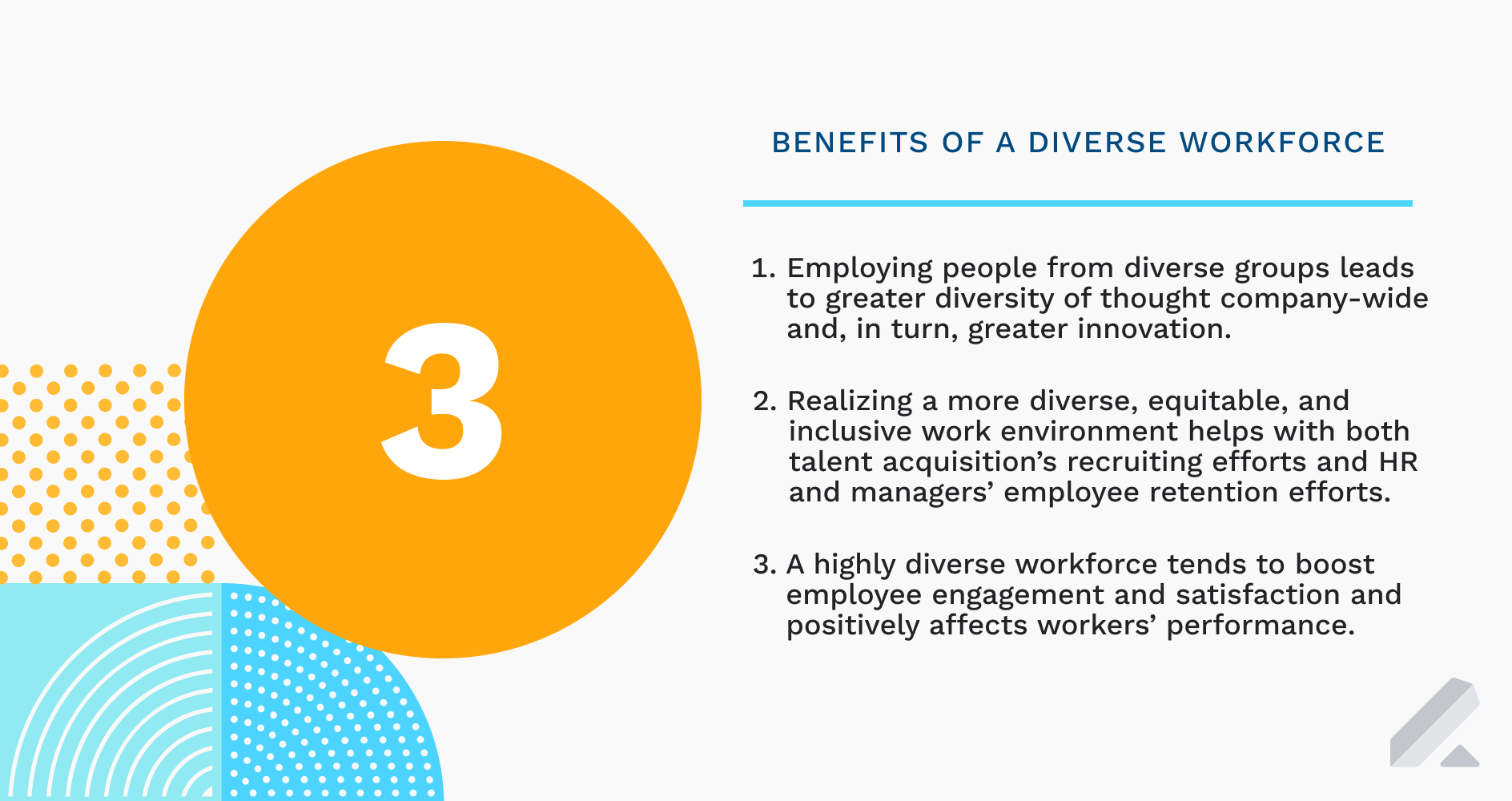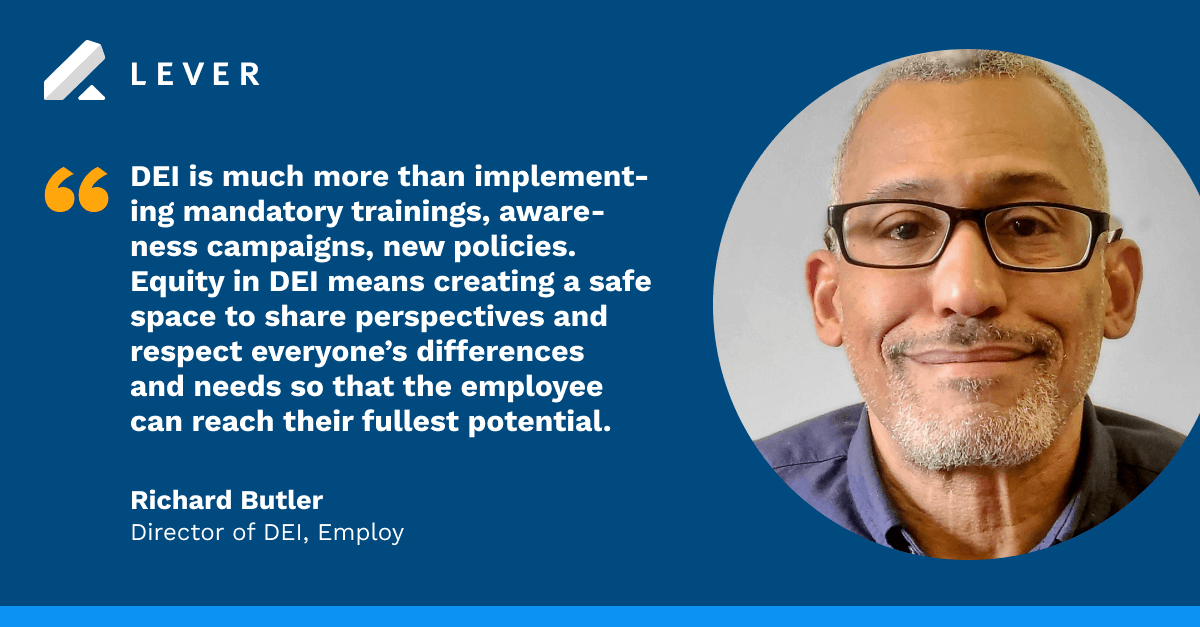We’ve said it before, and we’ll say it again: Diverse hiring starts with diverse interview panels.
Before making a decision as vital as where to build their career, candidates want to feel assured that they’ll belong within an organization. One interview can make or break that decision.
As a hiring leader, you’re on the front lines. Thankfully, there are strategies you can leverage to optimize your interviews for diversity, equity, and inclusion (DEI).
Here are five tips that, collectively, will give you the results you’re looking for.

1) Start by acknowledging the unconscious bias in the room
We’re all naturally wired to make decisions and assumptions based on our unique perception of the world. Our subjective opinions are learned stereotypes — formed from our upbringing, social groups, and societal exposures — that sway our decisions, without us realizing it.
In order to create a diverse interview panel, start by urging everyone on your team to acknowledge the part we all play in relying on unconscious bias.
Create a transparent, consistent, and objective process for diversity and inclusion training so that fair hiring practices are always top of mind. Only then can you begin to take the necessary steps to stop gut-driven decisions from influencing your hiring decisions.
2) Train existing employees as interviewers
Don’t just assign interviews to the TA team. Consider adding non-HR employees to the mix, too.
By leveraging a team-based approach, you’ll gain the perspectives of employees from all over the organization. Plus, when you include them in the hiring process, you demonstrate that you value your team’s input, leading to higher engagement and quick buy-in with new colleagues.
But just like the talent acquisition team, anyone who is facilitating interviews should be trained to do so, such as having hiring teams trained in neurodiversity recruiting.
Prompt them to consider important questions like, “Are there non-verbal cues, such as appearance or fidgeting, that are affecting my overall impression?”
The more interviewers you have trained, the more diverse your panels can be, which not only increases the quality of your hiring decisions, but also the quality of the candidate relationship.

3) Encourage a post-interview debrief
When done right, a post-interview debrief can add tremendous value to the hiring decision.
After completing an interview, ask each team member to provide feedback based on the candidate’s hard and soft skills. To avoid the interviewers being influenced by the “loudest voice in the room,” facilitate the feedback through a digital system.
Don’t forget to discuss what the candidate might bring to your company culture. Explore candidates who can bring a diverse range of values, beliefs, and experiences that will positively impact your company.
You may consider inviting a lead recruiter to mediate the discussion and challenge bias.
4) Get candidate feedback and adapt
As a hiring leader, you should always be adapting, revitalizing, and updating your practices to ensure a fair and inclusive interview process. To make that lift a little lighter, ask for candidate feedback. Candidates are eager to share their experiences with you.
Plus, the simple act of asking demonstrates to candidates that diversity and inclusion matter, and that they’re seen, heard, and valued — regardless of whether they get the job or not.
Ultimately, feedback gives you the opportunity to improve your overall candidate experience. While some feedback may be hard to hear, challenging yourself to provide an equitable experience for all candidates is worth it.
And, when you give your candidates a welcoming space to voice their opinions — good or bad — they are much less likely to speak negatively about your organization to outsiders, potentially harming your employer brand.

5) Provide a standardized interview process
Before walking into an interview, make sure that your process is structured. Instead of encouraging free-flowing conversations, ask each candidate the same set of questions, in the same way, and in the same order every time.
When you focus on a structured, data-driven interview, you will evaluate candidates based on a strict set of criteria, which greatly improves the quality of hiring decisions. And by evaluating all candidates on a level playing field, decisions will be much more equitable as well.
The bottom line: DEI matters and must be championed in all aspects of a company’s culture, including the interview process. Candidates don’t just want to hear that a company cares about DEI. They want to see proof at every touchpoint in their hiring journey.
Making concerted efforts to arm your interviewers with equitable recruitment practices goes a long way in creating a diverse interview panel and a welcoming, inclusive interview process.
Watch our on-demand webinar to learn how to conduct a thorough DEI audit of your recruitment, management, and HR practices and use those insights to improve.



